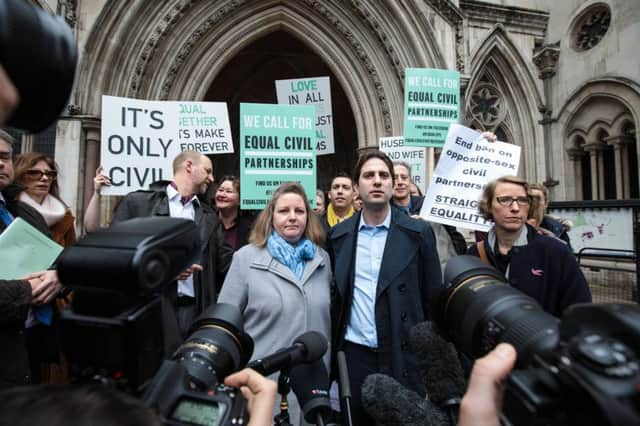I do believe laws on marriage need fix


The words of Rebecca Steinfeld and Charles Keidan from London, who recently lost their Court of Appeal case campaigning for heterosexuals to have the right to civil partnerships.
And of course, they have a point. Why should long-term couples not have the same legal rights and protections as married couples? It would be hard nowadays to see how anyone could seriously object to this.
Advertisement
Hide AdAdvertisement
Hide AdHowever, Keidan and Steinfeld framed their case as an equality issue, arguing that they were being discriminated against because of their sexual orientation.
“We are being treated differently because of our sexuality,” Steinfeld said after their defeat at the Court of Appeal, flanked by signs calling for “straight equality”.
She was referring to the fact that, at present, same sex couples have the option of entering into marriage, civil partnership or cohabitation while heterosexual couples have simply the choice of marriage or cohabitation.
From all accounts it was a difficult decision for the Court of Appeal to make. Few expected the Court to rule in favour of extending civil partnerships, despite thousands having petitioned for such change.
It was accepted by the Court that there could be a potential breach of the couple’s human rights by not being permitted to enter into a civil partnership instead of a marriage. However, the Court felt the issue was one for the UK Government to address in terms of new legislation.
The government is currently looking into this matter and reviewing the number of civil partnerships, following same sex marriage being legalised in Scotland, England and Wales in 2014.
It may be that the government ultimately decides to abolish the concept of civil partnerships altogether, which would put both same sex and heterosexual couples on the same footing. In any event, reports are suggesting a 70 per cent decrease in civil partnership as more same sex couples opt for marriage instead.
It is unusual for a test case on discrimination to be taken by a majority group in this way. In the absence of any new legislation that protects cohabitants’ rights on property, finances and children, heterosexual couples who do not wish to marry can be left most vulnerable.
Advertisement
Hide AdAdvertisement
Hide AdResponding to the decision, Nigel Shepherd, chair of Resolution – formerly the Solicitors Family Law Association – said: “It is understandable that some couples are attracted to a form of registered partnership that is not marriage, but which will give them similar protection to marriage. That said, from a purely legal perspective, it makes little sense to retain civil partnership. But, if the option of civil partnerships for same sex couples is to continue to be retained, then civil partnerships must also be available to opposite sex couples in order to avoid discrimination.”
Here in Scotland, limited rights were introduced by the Family Law (Scotland) Act 2006, allowing cohabiting couples to make certain financial claims against one another on separation to address any economic unfairness that had arisen during their period of cohabitation; unfortunately, this particular legislation is still in a state of flux.
Accordingly, it is very difficult for solicitors to predict not only how courts will actually deal with any such claims but also the eventual outcome of any disputed claims.
One way to create certainty, where none exists at present, is for partners to enter into Cohabitation Agreements. Romantic they are not, but practical they certainly are. Being realistic when first moving in together could certainly save future emotional and financial heartache for both parties.
Such agreements might not feature large in the minds of young couples, with little wealth, setting up their first home together – but they really ought to. Likewise, for couples, who may have already come through a divorce and do not wish to marry again, a Cohabitation Agreement would undoubtedly be worth considering.
The shape of family life, across all demographics, has changed hugely over the last 50 years, with many people now choosing simply to live with their partners rather than to tie the knot. However, while trends have changed immeasurably, unfortunately the law has been slow to keep up.
Ewan M Campbell is an Associate and Family Law specialist at Russel + Aitken LLP